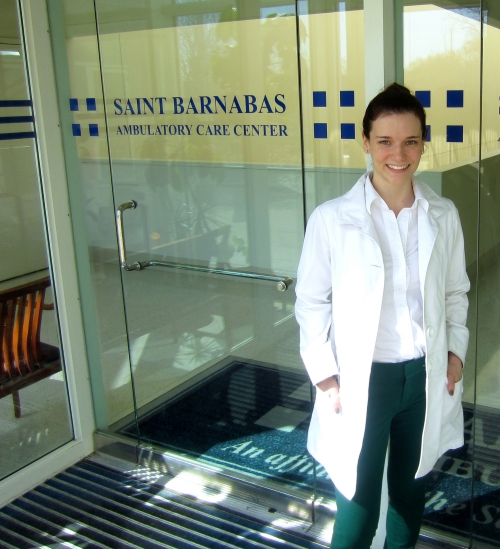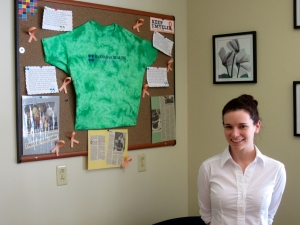Smiling and inspiring
Stephanie Butler turns a diagnosis into a calling

Diagnosed with multiple sclerosis, Stephanie Butler serves on a committee for the Accelerated Cure Project. "ACP hopes to accelerate research efforts by providing researchers access to a biosamples that can be used in place of recruiting participants for clinical trials," she says, "This cuts both the time, and the cost of clinical research. Recently we received $93.5 of funding from PCORI to launch an MS Patient Powered Research Network (MS-PPRN). This gives people with MS the opportunity to dictate what research projects are most important to them through the iConquerMS online portal. They can also choose to share their health information and/or biosamples with the researchers via the portal. If they choose to help with research being done on biomarkers they can do so via a home-based collection system, or through laboratories near their homes."
Stephanie Butler ’09 BSN, RN, CCRN, MSCN is an inspirational example of how a person can take devastating news and turn it into a way to create change and instill hope in others. Stephanie, now 27, thought she had her life planned out after graduation from Villanova. She began her journey as a Neurosurgical ICU at Georgetown University Hospital in Washington, D.C. for three years, followed by a year of travel nursing in New Jersey, before starting nurse anesthesia school at Rutgers University in the spring of 2012.
Stephanie had led a very active lifestyle with Cross Fit and varsity-level rowing. She had been running one day around the holidays, and noticed that her right foot “fell asleep and never woke up.” The numbness was spreading to other extremities, but she had thought maybe she had pinched a nerve during a workout. Being so busy with school, she did not have the time to see her doctor.
On January 8, 2013, one and a half years into the anesthesia program and on her first day prepping to administer anesthesia in the OR, she Stephanie noticed she was having a difficult time drawing up medications in the syringe. She was dizzy, felt foggy and her vision was spotty. She then lost feeling in her right arm and hand and in everything below her waist. Stephanie was rushed to the emergency department, and subsequently spent seven days as an inpatient.
On January 25th, after multiple tests and false diagnoses, she was told she had multiple sclerosis (MS). MS is an immune-mediated process where the body’s immune system attacks the central nervous system’s nerve fibers and myelin (a fatty sheath around nerve fibers) and causes a scar (sclerosis) which interrupts normal nerve impulses.

Stephanie maintains an inspiration board for patients with MS.
Where most people would see this as an end to their story, Stephanie saw it as just the beginning. She is now working towards a degree to become a family nurse practitioner at Rutgers. She has become an MS certified nurse, and currently works at St. Barnabas Multiple Sclerosis Comprehensive Care Center in Livingston, N.J., the same facility where she is also a patient. She is also an advocate for MS research and awareness and writes an MS blog, http://justkeepsmyelin.com.
Stephanie, along with other people with MS and members of the MS society from all over the country, recently participated in the 2014 National Public Conference in Washington, D.C. and was able to meet with senators and congressmen to discuss MS, increasing the NIH’s budget for MS research and passing the bill on Complex Rehabilitation Technology. Even though the Rep. Bill Pascrell from her home state did not attend the meeting on Capitol Hill, it did not stop Stephanie from visiting him back in New Jersey to discuss the same topics. If this bill were to be passed it would mean that Medicare would cover motorized wheelchairs for those patients that have a more advanced stage of MS. This equipment is currently not covered by Medicare and can cost up to $25,000. This bill would also require that manufacturers of the equipment to offer maintenance, repairs, and training of the equipment.
Stephanie’s blog about MS not only contains helpful information about the disease but is also an inspiration for individuals with MS or knows someone with the disease. There, readers can find Stephanie’s personal story about her disease and also ask questions on the blog page. She is very eager to share and help those that have concerns about MS. She has also begun writing for www.MultipleSclerosis.net , and is excited to be giving a TED talk at TEDxHerndon in March 2015. "It's about turning personal hardships into opportunities to make a difference, and will mainly be me talking about how I turned my diagnosis and my nursing experience into an opportunity to make an impact in the MS community," Stephanie explains.
In her nursing role, Stephanie spends most of her time talking with patients on the phone, answering questions and triaging emergent situations. She also closely interacts with the neurologists who then order tests, prescriptions, medical equipment, and consults if necessary. She enjoys her practice and finds satisfaction in knowing that she can immediately help patients.
Despite being so young, Stephanie is a role model and positive influence for those diagnosed with MS and that same positivity is noted by others with whom she comes in contact. MS can be a devastating illness, but she has not let it get the best of her. Stephanie’s mother is extremely proud of her, sharing in a recent letter to the College, “It occurred to me that Stephanie is the definition of what Villanova strives to instill in their students. Acting compassionately and succeeding while serving others is at the core of my daughter’s personality. Thank you for preparing Stephanie to have a successful career in nursing and to be the incredible person she has become.”
Stephanie knows that life will be hard at times, but she is living her life to the fullest and wants to help others do the same. In her blog she reflected on lessons learned from pediatric clinical practica in her graduate program, sharing these inspiring words, “So let’s all take a few notes from these inspiring children. Get some cool shoes. Laugh often. Find magic in everyday life. Let a plate of chicken fingers brighten your day. Accept that MS is here to stay, but know that you can still live the life of your choosing. If they can do it, so can I.”
